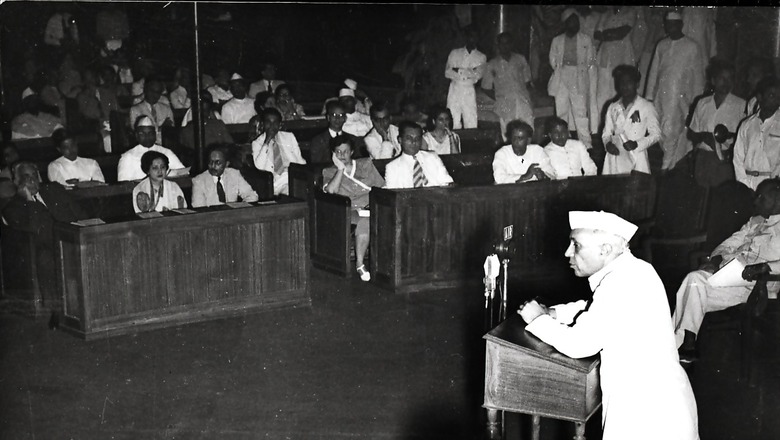
views
Jawaharlal Nehru had once stated: “Article 370, as the House will remember, is a part of certain transitional provisional arrangements. It is not a permanent part of the Constitution. It is a part as long as it remains so.”
The Supreme Court is poised to settle the debates surrounding the abrogation of Article 370 when it delivers its verdict on Monday. Critics argue that the decision to abrogate the Article was unilateral as it was considered a permanent constitutional provision, and only the Jammu & Kashmir Constituent Assembly had the authority to make such a decision. However, the assembly was dissolved on January 26, 1957. The NDA government, which abrogated the Article, contends that it was a temporary provision and that demands for its complete repeal had been raised much earlier.
A debate in the Indian Parliament on November 27, 1963 encapsulates the essence of the issue, with parliamentarians posing questions about repealing the Article and receiving responses from then prime minister Jawaharlal Nehru and his government representatives.
A group of 19 parliamentarians, including Hari Vishnu Kamath, Prakash Vir Shastri, Bhagwat Jha Azad, PC Boroah, Mohan Swarup, Dr LM Singhvi, Vishram Prasad, Raghunath Singh, DD Mantri, Ram Ratan Gupta, PR Chakraverti, Sidheshwar Prasad, DD Puri, Kachhavaiya, DC Sharma and Hem Raj, sought the Government of India’s response on the ‘Closer Integration of Jammu & Kashmir with India’. The broad question was divided into three parts.
The Minister of Home Affairs was asked:
- Whether any measures or proposals had been initiated since October 1962 for further integrating the State of Jammu and Kashmir with the rest of the Indian Union?
- If so, what were the details?
- Whether the repeal of Article 370 of the Constitution was under consideration in consultation with the Jammu & Kashmir State Government.
Responding to questions 1 and 2, RM Hajarnavis, the Minister of State in the Ministry of Home Affairs, had stated that “an Order of the President under article 370 of the Constitution was issued on the 25th of September, 1963, applying to Jammu & Kashmir State entry 26 of the Concurrent List (List III) in the Seventh Schedule in respect of legal and medical professions and other consequential provisions of the Constitution and a proposal to apply to Jammu and Kashmir entry 24 of the Concurrent List, in so far as it relates to welfare of labour in the coal-mining industry, is under consideration.”
He mentioned that “it has been decided that representatives of Jammu and Kashmir in the Lok Sabha should be chosen by direct election as in other States. Effect will be given to this decision after the termination of the present emergency”.
He further added, “It has also been decided that the Sadar-i-Riyasat and Prime Minister of Jammu and Kashmir should be designated as Governor and Chief Minister respectively. Legislation to give effect to the proposal is expected to be taken up during the next session of the State Legislature.”
The interpretation of his words implied a reduction in the special powers granted to the state of Jammu & Kashmir, with the inclusion of laws from the Concurrent List. Regarding the law-making powers of the Government of India, the state list was not applicable to Jammu & Kashmir, and neither was the Concurrent List.
The Minister of State further clarified that “Article 370 of the Constitution occurs in Part XXI of the Constitution which deals with temporary and transitional provisions.” He stated: “Since this Article was incorporated in the Constitution, many changes have been made which bring the State of Jammu and Kashmir in line with the rest of India and the State is fully integrated to the Union of India.”
However, the Government of India at that time was not in favour of its complete repeal. “Government are of opinion that they should not take any initiative now for the complete repeal of Article 370.” They left that option in the hands of the Jammu & Kashmir state government, stating: “This will, no doubt, be brought about by further changes in consultation with the Government and the Legislative Assembly of Jammu and Kashmir State. This process has continued in the last few years and may be allowed to continue in the same way.”
Nehru endorsed these words, stating: “As a matter of fact, as the Home Minister has pointed out, it has been eroded, if I may use the word, any many things have been done in the last few years which have made the relationship of Kashmir with the Union of India very close. There is no doubt that Kashmir is fully integrated.”
“We feel that this process of gradual erosion of Article 370 is going on. Some fresh steps are being taken and in the next month or two they will be completed. We should allow it to go on. We do not want to take the initiative in this matter and put an end to Article 370. This initiative, we feel, should come from the Kashmir state government and people. We shall gladly agree to that. That process is continuing,” he added.
However, he also acknowledged that: “Article 370, as the House will remember, is a part of certain transitional provisional arrangements. It is not a permanent part of the Constitution. It is a part as long as it remains so.”
Understandably, at that time, the state of Jammu & Kashmir was a peaceful territory, and the state government and legislature had amicable relations. This began to change in the late 1980s when Pakistan pushed terrorism, attempting to change the course with the sole agenda of merging the state of Jammu & Kashmir into Pakistani territory.
This, combined with the separatist politics of the state, made defending temporary Article 370 a war cry, further advancing Pakistan’s agenda. This raised questions about the state’s assurances of complete and full integration with India. The process to repeal Article 370 with the state’s assurance that was once considered “ongoing” was put behind closed doors.




















Comments
0 comment